Flash Back to Previous Conventions
15th MAP Convention2013
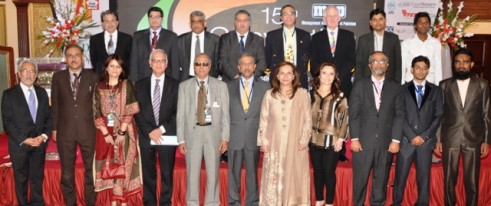 Management Association of Pakistan’s 15th Convention was held in Karachi on 4th & 5th December 2013. The convention was organized by MAP and the lead partner for the event was Pakistan’s leading training & management services provider, Octara Pvt Limited.
The convention featured renowned global thought leaders and eminent futurists including Dr. José Luis Cordeiro – PhD, M.Sc – MIT USA, Mr. Rohit Talwar – Award Winning Global Futurist and Mr. Roger Harrop – renowned Leadership & Business Growth Speaker. Prominent Pakistani leading visionaries such as Dr. Ishrat Hussain – Former Governor State Bank of Pakistan and Mr. Hussain Dawood – Chairman Dawood Hercules Corporation, presented a local perspective towards the change process for organizations in future.
The prominent feature of the convention was the Panel discussion on the topic “Leaders of the Future” which was moderated by Mr. Ramiz Allawala – renowned management speaker, and constituted of notable panelists including Mr. Muhammad Aliuddin Ansari – President & CEO, Engro Corporation, Mr. Amir Paracha – VP Customer Development, Unilever Pakistan Ltd, Dr. Zeelaf Munir – Chairperson, Executive Management Board, English Biscuits Manufacturers, Mr. Naeem Zamindar – Chief Executive Officer, Wateen Telecom Private Limited, Mr. Rohit Talwar and Mr. José Luis Cordeiro; who shared their profound insights and their perspective to leadership challenges and future of organizations. Ms. Rabia Gharib was the Master of Ceremonies for the Convention.
The convention was followed by two in-depth workshops, held on December 5, 2013 that focused on the most pressing issues for today’s organizations. These half-day each workshops – “Creating Future-Focused Organizations” and “Human Enhancement for Future Organizations”, were led by Mr. Rohit Talwar and Mr. José Luis Cordeiro respectively and attended by over 300 participants from various organizations around the country.
Management Association of Pakistan’s 15th Convention was held in Karachi on 4th & 5th December 2013. The convention was organized by MAP and the lead partner for the event was Pakistan’s leading training & management services provider, Octara Pvt Limited.
The convention featured renowned global thought leaders and eminent futurists including Dr. José Luis Cordeiro – PhD, M.Sc – MIT USA, Mr. Rohit Talwar – Award Winning Global Futurist and Mr. Roger Harrop – renowned Leadership & Business Growth Speaker. Prominent Pakistani leading visionaries such as Dr. Ishrat Hussain – Former Governor State Bank of Pakistan and Mr. Hussain Dawood – Chairman Dawood Hercules Corporation, presented a local perspective towards the change process for organizations in future.
The prominent feature of the convention was the Panel discussion on the topic “Leaders of the Future” which was moderated by Mr. Ramiz Allawala – renowned management speaker, and constituted of notable panelists including Mr. Muhammad Aliuddin Ansari – President & CEO, Engro Corporation, Mr. Amir Paracha – VP Customer Development, Unilever Pakistan Ltd, Dr. Zeelaf Munir – Chairperson, Executive Management Board, English Biscuits Manufacturers, Mr. Naeem Zamindar – Chief Executive Officer, Wateen Telecom Private Limited, Mr. Rohit Talwar and Mr. José Luis Cordeiro; who shared their profound insights and their perspective to leadership challenges and future of organizations. Ms. Rabia Gharib was the Master of Ceremonies for the Convention.
The convention was followed by two in-depth workshops, held on December 5, 2013 that focused on the most pressing issues for today’s organizations. These half-day each workshops – “Creating Future-Focused Organizations” and “Human Enhancement for Future Organizations”, were led by Mr. Rohit Talwar and Mr. José Luis Cordeiro respectively and attended by over 300 participants from various organizations around the country.
14th MAP Convention2013
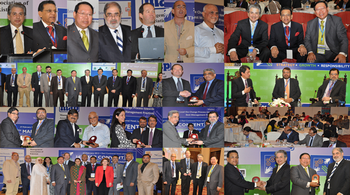
“Strategy, Growth and Responsibility” will be the three-pronged focus in Lahore on 27th of February 2013, when Presidents of the Management Associations of Pakistan, the Philippinesand Chairman of the Malaysian Institute of Management will share the stage at the 14th MAP Convention.
MAP’s convention has now gained international attention and recognition, attracting participants from all around the world. Our vision for the 14th Annual MAP Convention is to make it even bigger and better, where a confluence of divergent thoughts, ideas, nationalities will all come together under one roof to make even greater things happen. In order to make this a reality we have been successful in streamlining an impressive lineup of speakers for the event. Datuk Seri Mohamed Iqbal, Chairman of the Malaysian Institute of Management and Melito “Mel” S. Salazar, Jr – Chairman of the Inter Asia Development Bank & President of Management Association of the Philippines. The global pioneer of strategy implementation and best-selling author, Robin A. Speculand, a delegation from the Boeing Commercial Airplanes headed by Mr. Jeffrey VerWay – Director, Product Strategy are some of the international names that will grace the occasion. The convention will also feature Sakib Sherani – Former Principal Economic Advisor; Kazi Abdul Muqtadir – Deputy Governor, State Bank of Pakistan; Azim Jamal – International Inspirational Speaker and Best-Selling Author of his seventh book, Business, Balance & Beyond; Haroon A. Khan – MD, Pak Elektron Limited (PEL) and many more. The convention will be moderated by Eithne Treanor who works closely with CNBC Arabia, China’s CCTV and various business publications.13th MAP Convention2012
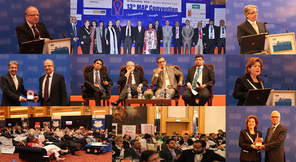 The 13th Management convention was organized on 18th December 2012, “Leadership, People and Innovation” was the theme of the convention. The Keynote Macroeconomic Address was delivered by the renowned economist and former Vice President of the World Bank who travelled from WashingtonDCto be at the convention, Mr. Shahid Javed Burki. Other speakers included; South Asian Affair expert, Dr. Marie Lall, Head of Retail and Consumer Banking from Habib Bank, Ms. Sima Kamil, Mr. Mike Sherman, Head of Living Analytics and Group Digital Life at SingTel, who travelled from Singapore to be with us. Mr. Furqan Qureshi, Senior Executive Vice President Business Zone South, PTCL, led a Panel Discussion, his panelists included Chairman of the Institute of Public Policy, Mr. Shahid Javed Burki, Founder and CEO, Pakistan Innovation Foundation; CEO Technomics International and Fellow, World Technology Network, Dr. Athar Osama, CEO, Gillette Pakistan, Saad Amanullah Khan and the head of innovative products and internal expansion at Bayt.com Muhammad Younas. We heard about the future of banking from the Former President and Chief Executive Officer of the Royal Bank of Scotland in Pakistan, Mr. Shehzad Naqvi. Mr. Asif Jooma, President of the Overseas Investors Chamber of Commerce and Industry and Managing Director, Abbott Laboratories (Pakistan) addressed the challenges and the opportunities of doing business in Pakistan. The convention ended with the trend-spotter, futurologist and renowned author Magnus Lindkvist from Sweden challenging the audience to join “the liberation movement of innovation.” He addressed the potential of unlocking a new world of possibility by getting used to the fact that things are changing at a pace beyond our control.
The details of the companies that played a vital role in making the event successful by providing MAP with sponsorship are as follows. HBL was the Platinum Sponsor, EBM (Pvt.) Ltd were the Gold Sponsors. EFU Life, AkzoNobel, JS Bank and PPL were our Silver Sponsors. Turkish Airline was the Official Airline, IoBM our Academic Partner and SICPA, NIB Bank and Shan Food our Associate Sponsors. Online Media Partner was The News Tribe, Logistics Partner was TCS, Technology Media Partner was CIO Pakistan and Strategic Media Partner was Jang Group.
The 13th Management convention was organized on 18th December 2012, “Leadership, People and Innovation” was the theme of the convention. The Keynote Macroeconomic Address was delivered by the renowned economist and former Vice President of the World Bank who travelled from WashingtonDCto be at the convention, Mr. Shahid Javed Burki. Other speakers included; South Asian Affair expert, Dr. Marie Lall, Head of Retail and Consumer Banking from Habib Bank, Ms. Sima Kamil, Mr. Mike Sherman, Head of Living Analytics and Group Digital Life at SingTel, who travelled from Singapore to be with us. Mr. Furqan Qureshi, Senior Executive Vice President Business Zone South, PTCL, led a Panel Discussion, his panelists included Chairman of the Institute of Public Policy, Mr. Shahid Javed Burki, Founder and CEO, Pakistan Innovation Foundation; CEO Technomics International and Fellow, World Technology Network, Dr. Athar Osama, CEO, Gillette Pakistan, Saad Amanullah Khan and the head of innovative products and internal expansion at Bayt.com Muhammad Younas. We heard about the future of banking from the Former President and Chief Executive Officer of the Royal Bank of Scotland in Pakistan, Mr. Shehzad Naqvi. Mr. Asif Jooma, President of the Overseas Investors Chamber of Commerce and Industry and Managing Director, Abbott Laboratories (Pakistan) addressed the challenges and the opportunities of doing business in Pakistan. The convention ended with the trend-spotter, futurologist and renowned author Magnus Lindkvist from Sweden challenging the audience to join “the liberation movement of innovation.” He addressed the potential of unlocking a new world of possibility by getting used to the fact that things are changing at a pace beyond our control.
The details of the companies that played a vital role in making the event successful by providing MAP with sponsorship are as follows. HBL was the Platinum Sponsor, EBM (Pvt.) Ltd were the Gold Sponsors. EFU Life, AkzoNobel, JS Bank and PPL were our Silver Sponsors. Turkish Airline was the Official Airline, IoBM our Academic Partner and SICPA, NIB Bank and Shan Food our Associate Sponsors. Online Media Partner was The News Tribe, Logistics Partner was TCS, Technology Media Partner was CIO Pakistan and Strategic Media Partner was Jang Group.
12th MAP Convention2011
 Governor State Bank of Pakistan Mr. Yaseen Anwar inaugurating 12th Management Convention on “Leadership Challenges for Business Success” held on 14th December 2011. AIMA delegates led by their President Mr. Rajiv Vastupal also attended the convention.
Rajiv Vastupal President, All India Management Association (AIMA); Frederic Sicre Partner, Abraaj Capital (UAE); D. Shivakumar Senior Vice President, AIMA & Nokia India, Middle East & Africa; Syed Ali Raza Chairman, National Bank of Pakistan; Dr. Adil Najam VC, LUMS; Dr. Sohail H. Naqvi Executive Director, HEC; Khalid Awan Chairman, TCS; Kamran Y. Mirza Chief Executive, Pakistan Business Council; Jameel Yousuf Chairman, TPL Holdings; Usman A. Ghani Professor, University of Texas and other eminent personalities also spoke on the occasion.
Special mention must be made here of the companies which sponsored the 14th Convention: National Bank of Pakistan was the platinum sponsor of the event, while English Biscuit Manufacturers (Pvt) Ltd were the Gold sponsor. HBL, Jubilee General Insurance, Allied Bank, and ICI had supported the event as Silver sponsors. TCS was the logistic partner. Pakistan Petroleum Limited and IoBM had joined in as Associate Sponsor and Academic partner of the Convention respectively, while Jang Group was the Media partner.
Governor State Bank of Pakistan Mr. Yaseen Anwar inaugurating 12th Management Convention on “Leadership Challenges for Business Success” held on 14th December 2011. AIMA delegates led by their President Mr. Rajiv Vastupal also attended the convention.
Rajiv Vastupal President, All India Management Association (AIMA); Frederic Sicre Partner, Abraaj Capital (UAE); D. Shivakumar Senior Vice President, AIMA & Nokia India, Middle East & Africa; Syed Ali Raza Chairman, National Bank of Pakistan; Dr. Adil Najam VC, LUMS; Dr. Sohail H. Naqvi Executive Director, HEC; Khalid Awan Chairman, TCS; Kamran Y. Mirza Chief Executive, Pakistan Business Council; Jameel Yousuf Chairman, TPL Holdings; Usman A. Ghani Professor, University of Texas and other eminent personalities also spoke on the occasion.
Special mention must be made here of the companies which sponsored the 14th Convention: National Bank of Pakistan was the platinum sponsor of the event, while English Biscuit Manufacturers (Pvt) Ltd were the Gold sponsor. HBL, Jubilee General Insurance, Allied Bank, and ICI had supported the event as Silver sponsors. TCS was the logistic partner. Pakistan Petroleum Limited and IoBM had joined in as Associate Sponsor and Academic partner of the Convention respectively, while Jang Group was the Media partner.
11th MAP Convention2008
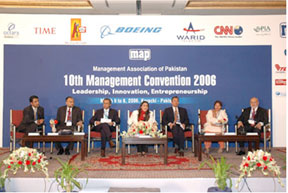 The 11th Management convention was organized on 2nd to 4th December 2008 at Sheraton Hotel, Karachi Pakistan. The theme of convention was “Managing in the 21st Century”. The convention was inaugurated by Mr. Shaukat Tarin, Advisor to the Prime Minister on Finance Revenue and Economic Affairs of Pakistan.
The he working sessions of the convention was held on 3rd and 4th December 2008 on the themes: Entrepreneurship, Globalization, Retailing & Supply Change, Corporate Governance, Human Resource Management, Leadership and Innovation, etc. The special futures of the convention were CEO’s Round- Table Conference on “Doing Business in Pakistan” and panel discussion “Managing your strategic Hr Impact”. Eminent scholars and renowned experts from within and outside Pakistan were invited to chair and address the working sessions.
The convention was sponsored by the international and national companies such as: Boeing, Emirates Airlines, Pakistan State Oil Company Limited. English Biscuit Manufactures (Pvt) Limited, Indus Motor Company Limited, ICI Pakistan Limited and Pakistan Cables Limited. Well reputed media groups such as CNN, CNBC, The Times and Jang / Geo were strategic media partners for the convention coverage.
The 11th Management convention was organized on 2nd to 4th December 2008 at Sheraton Hotel, Karachi Pakistan. The theme of convention was “Managing in the 21st Century”. The convention was inaugurated by Mr. Shaukat Tarin, Advisor to the Prime Minister on Finance Revenue and Economic Affairs of Pakistan.
The he working sessions of the convention was held on 3rd and 4th December 2008 on the themes: Entrepreneurship, Globalization, Retailing & Supply Change, Corporate Governance, Human Resource Management, Leadership and Innovation, etc. The special futures of the convention were CEO’s Round- Table Conference on “Doing Business in Pakistan” and panel discussion “Managing your strategic Hr Impact”. Eminent scholars and renowned experts from within and outside Pakistan were invited to chair and address the working sessions.
The convention was sponsored by the international and national companies such as: Boeing, Emirates Airlines, Pakistan State Oil Company Limited. English Biscuit Manufactures (Pvt) Limited, Indus Motor Company Limited, ICI Pakistan Limited and Pakistan Cables Limited. Well reputed media groups such as CNN, CNBC, The Times and Jang / Geo were strategic media partners for the convention coverage.
10th Management Convention2006
The 10th Management convention was held on March 6 – 8 of 2006. The theme of the convention was “Leadership Innovation, Entrepreneurship”. The convention was inaugurated by Mr. Mohammed (mian somroo) Chairman Senate of Pakistan. Ms. Micole Piasecki Executive Vice President, the Boeing Company USA was the key-note speaker. Papers were presented on the following topics: Leadership
- Building Leadership Capabilities for the Global Economy
- Human Leadership
- International Entrepreneurship
- Galvanizing Entrepreneurship in Pakistan
- Emerging Geo-Political Scenario and its Impact on Business
- Moderator: International Broadcast Journalist
- Influencing and Entrepreneurial Spirit
- Leading Organizational Turnaround
- From Local to International through Marketing Innovative Products – ICICI Bank
- Creating a Technology Brand
- What is takes to Market a Country
- Globalization and National Development Challenges a Regional Strategy
- Creating Breakthrough Organizations in Public Service Sector
- Innovation intensity: A concept in search of a method
- Technology for the Masses
- Strategic Humor
- New Perspectives in Logistics and Supply Chain Management
- An Effective Industry Academia Liaison
9th Management Convention 20042004
The 9th Management convention was held on April 19, 2004 at the Sheraton Hotel Karachi. The theme of the convention was “New Management Frontiers”. The convention was inaugurated by Prime Minister of Pakistan Mir Zafarullah Khan Jamali. Mr. Shaukat Aziz, Minister for Finance and Economic Affairs, Government of Pakistan was the key-note speaker. Papers were presented on the following topics:
- WTO & Globalization
- Corporate Excellence Awards Ceremony
- Can Globalization Reduce Poverty
- Leveraging Human Resource Capital for Organizational Development
- Multinational Corporations in the 21st Century
- Best Management Practices of the Companies in the Middle East
- Corporate Governance & Ethics
- How Supply-Chain Management can Change the Fortune of a Business?
- Should Public Sector Enterprises be Privatized of be given to Professional Management with and Independent Board?
8th Management Convention1996
The theme of the eighth convention was “Quality Management – The Way Forward”. It was organized on March 27-28, 1996 at Karachi Sheraton Hotel. Sardar Farooq Ahmed Khan Leghari, President, Islamic Republic of Pakistan was the Chief Guest on the concluding day. Key-note address was delivered by late Dr. Mahbubul Haq. Papers were presented on the following topics:
- What is Quality Management
- How Do You Make it Happen
- Promoting Quality Culture
- Role of the Government
- Recognition of Quality Management
7th Management Convention1994
The seventh convention was organized on April 20-21, 1994 at Karachi on the theme of “International Competitiveness”. The convention was inaugurated by Sardar Farooq Ahmad Khan Leghari, then President, Islamic Republic of Pakistan. Mr. Moeen Qureshi, former Prime Minister of Pakistan delivered the Key-note address on “The Unfinished Agenda of Pakistan”. The seventh convention was organized on April 20-21, 1994 at Karachi on the theme of “International Competitiveness”. The convention was inaugurated by Sardar Farooq Ahmad Khan Leghari, then President, Islamic Republic of Pakistan. Mr. Moeen Qureshi, former Prime Minister of Pakistan delivered the Key-note address on “The unfinished Agenda of Pakistan”. Papers were presented on the following topics:
- International Competitiveness – Challenges & Opportunities
- International Competitiveness – A Global View
- Sociological / Social Factors – Critical for Success
- The simulative Role of the Government
- Development of Professional Managers
- Success Stories
6th Management Convention1992
The theme of sixth convention was “Self Reliance”, it was organized on February 8-9, 1992 at Lahore. Mr. Ghulam Ishaq Khan, then President, Islamic Republic of Pakistan was the Chief Guest. The Key-note speaker was Mr. Sartaj Aziz, then Federal Minister for Finance and Economic Affairs. Papers were presented on the following topics:
- Value Added Exports
- International Cooperation for Export Development
- Increasing the Tempo of Investment
- Productivity – The Key to Self Reliance
- Infra-Structure Development
5th Management Convention1987
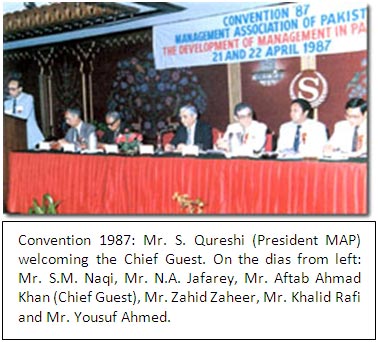 The Fifth Convention was held in Karachi on April 21 and 22, 1987. Its theme was: “The Development of Management in Pakistan”. The Convention was inaugurated by Mr. Aftab Ahmad Khan, the then Chairman, National Development Finance Corporation.
The theme of the Convention was selected because it was felt that management is the single most crucial factor in the development of the economy in any country.
The aim at this Convention was to critically appraise the progress of development in the field of management in Pakistan after four decades of its establishment. This would also help to develop an insight into what kind of managerial synthesis is needed for our talent-rich but resource-poor country now and in the years to come. With this aim in view the topics selected for discussion were:
The Fifth Convention was held in Karachi on April 21 and 22, 1987. Its theme was: “The Development of Management in Pakistan”. The Convention was inaugurated by Mr. Aftab Ahmad Khan, the then Chairman, National Development Finance Corporation.
The theme of the Convention was selected because it was felt that management is the single most crucial factor in the development of the economy in any country.
The aim at this Convention was to critically appraise the progress of development in the field of management in Pakistan after four decades of its establishment. This would also help to develop an insight into what kind of managerial synthesis is needed for our talent-rich but resource-poor country now and in the years to come. With this aim in view the topics selected for discussion were:
- Business education and management training
- Productivity and optimisation of resources
- The role of government in the management of public sector enterprises
- The contribution of the private sector in the development of management in Pakistan
- The role of manpower in the transformation of the society
- Pakistani situations in management cases should be developed and used for making business school curriculum relevant.
- Business schools should develop individuals in sector based degree curriculum, and the Pakistan Administrative Staff College and NIPA should become degree awarding institutes for middle career officers.
- The private sector should co-operate with educational institutes by setting up endowments and the government should provide tax relief to encourage such efforts.
- Emphasis should be laid on the type of primary education so as to produce the kind of talent which is needed for advanced education.
- All large organizations should establish production service departments which will be responsible for advising managers as to how they may reduce the input of the resources they need to create their prescribed output.
- A National Productivity Council should be established in Pakistan.
- The government having no national personnel policy for public enterprises, the majority of public enterprise managers are unsuitable by their background a specialist cadre should, therefore, be created with the necessary complements of proper and continued training in career planning.
- Precise and tangible criteria should be enforced and should take the form of concurrent performance evaluation by a single agency manned by qualified experts. Public enterprises should be given cut and dry aims in performance goals and both the resources and operational freedom to achieve these aims.
- Active interference in the day to day matters by the administrators leads to confusion as well as delay in decision making and also provides to public enterprise managers a ready made alibi for poor performance. The government’s role in relation to public enterprises should be strictly confined to policy directives only.
- The existing adverse relationship between the bureaucrats and the entrepreneurs impairs the economic environment and should be defused.
- A cross fertilization of ideas in the public and the private sectors should be encouraged so that entrepreneurs are inducted into the government.
4th Management Convention1984
 The Fourth Convention was held in Lahore on March 17 and 18, 1984. This was the first major event of MAP held in Lahore. Its theme was: “Corporate Management in Pakistan: Problems and Prospects”. The Convention was inaugurated by Mr. Agha Hasan Abedi, President, Bank of Credit and Commerce International. It was the first time that the inaugural address was made by a distinguished personality in the private sector.
Papers were presented on the following topics:
The Fourth Convention was held in Lahore on March 17 and 18, 1984. This was the first major event of MAP held in Lahore. Its theme was: “Corporate Management in Pakistan: Problems and Prospects”. The Convention was inaugurated by Mr. Agha Hasan Abedi, President, Bank of Credit and Commerce International. It was the first time that the inaugural address was made by a distinguished personality in the private sector.
Papers were presented on the following topics:
- Corporate management in Pakistan: an appraisal and challenge of the 80’s
- Corporate management in the public sector
- Corporate management in the private sector
- Employee – employer relationship
- Manpower development
- There should be massive allocation of attention and financial resources to the man-power and management development functions, particularly in the private sector where modern skills are required in large quantum jumps.
- A cadre of professional managers should be instituted so as the groom professionals for management in the particular context of the public sector enterprises.
- An institution should be established for training of this cadre on the lines of Pakistan Administrative Staff College and National Defence College.
- Management development should be need-based and integrated with the larger organizational systems.
- Training courses and material should be adapted to our conditions and languages with modern techniques.
- Courses in management should be introduced in technical colleges as well as for educational administrators.
- Corporate organizations should build strong liaison with the universities in terms of helping them help business and industry in turn.
- Emphasis should be placed on supervisory and worker training and education
- Transfer of Technology
- A massive technology absorption programme should be adopted for the whole country. Technology Cells should be set up in all corporate institutions to act as conduits for the inflow of latest technology.
- All technology transfer agreements should be exempted from tax.
- Large manufacturing concerns in both private and public sectors should allocate a portion of their funds to research and development and technology adaptation with a view to develop appropriate technology.
- Environment of Corporate Management
- Gross over-regulation of the corporate sector should end as it leads, amongst other things, to corrupt practices.
- Taxation structure should be rationalized so as to simplify and lighten the burden on corporations.
- Social and physical infrastructure should be developed to cope with modern industrial needs and allow industries grow unhampered.
- Management practices and methods in the Government should be improved so that private and public sector can interact with them more efficiently. The Government should appoint a commission for this purpose.
- Procedures for setting up corporations should be simplified and streamlined.
- As part of the social infra-structure, management of school systems and the family should be improved by giving management training to school administrators and parents.
- Boards of Directors of Public Sector Corporations should be granted autonomy with clear-cut definition of financial and social results to be achieved.
- Top management group in public corporate sector should be manned by professional managers.
3rd Management Convention1981
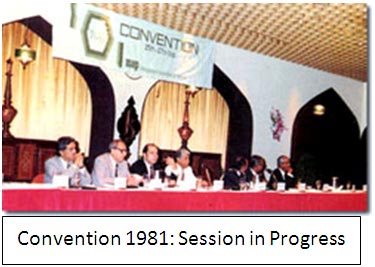 The Third Convention was held in Karachi on September 25 and 26, 1981. This Convention was held after a gap of nearly 12 years after the Second Convention. Its theme was: “Management Challenges in the Eighties”. The Convention was inaugurated by Lt. Gen. Saeed Qadir, then Federal Minister for Production and Railways.
The critical factor in the success of any policy or plan is the element of management. It is only with managerial cognizance of the economic challenges that countervailing forces could be generated to circumnavigate the dangerous whirlpools ahead. With this in mind the Association selected the following topics for the Convention:
The Third Convention was held in Karachi on September 25 and 26, 1981. This Convention was held after a gap of nearly 12 years after the Second Convention. Its theme was: “Management Challenges in the Eighties”. The Convention was inaugurated by Lt. Gen. Saeed Qadir, then Federal Minister for Production and Railways.
The critical factor in the success of any policy or plan is the element of management. It is only with managerial cognizance of the economic challenges that countervailing forces could be generated to circumnavigate the dangerous whirlpools ahead. With this in mind the Association selected the following topics for the Convention:
- Islamic principles of economic management
- Impact of international economic development on Pakistan
- Regulatory framework for private enterprise in Pakistan: a critical appraisal
- Incentives for private investment in Pakistan: an evaluation
- Management of public enterprises in Pakistan
- New dimensions of personnel management in Pakistan.
- Islamic principles of economic management
- Impact of international economic development on Pakistan
- Regulatory framework for private enterprise in Pakistan: a critical appraisal
- Incentives for private investment in Pakistan: an evaluation
- Management of public enterprises in Pakistan
- New dimensions of personnel management in Pakistan
2nd Management Convention1968
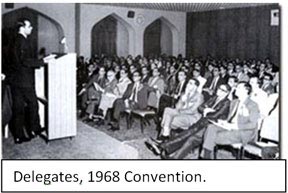 The Second Convention was held on April 24 and 25, 1968 again in Karachi. Its theme was: “Management and National Growth”. The Convention was inaugurated by Mr. M.M. Ahmed, at that time Deputy Chairman, Planning Commission, Government of Pakistan.
The subject matter was designed not merely to focus attention on good management’s vital relevance to economic progress, but more particularly to bring home the importance of accurate planning both at national and corporate levels.
Papers were presented on the following topics:
PLANNING FOR NATIONAL DEVELOPMENT
The Second Convention was held on April 24 and 25, 1968 again in Karachi. Its theme was: “Management and National Growth”. The Convention was inaugurated by Mr. M.M. Ahmed, at that time Deputy Chairman, Planning Commission, Government of Pakistan.
The subject matter was designed not merely to focus attention on good management’s vital relevance to economic progress, but more particularly to bring home the importance of accurate planning both at national and corporate levels.
Papers were presented on the following topics:
PLANNING FOR NATIONAL DEVELOPMENT
- A critical Review of the Third Five-Year Plan
- Impact of Fiscal and Monetary Policies on Investment
- Management Planning in Iran
- Management Planning in Turkey
- Management Planning in Pakistan
- Manpower Planning in Pakistan
- Operation Research
- The Role of Forecasting in Planning
- Long Range Manpower Planning
- Planning for a Computer
- The Development of Industries for Export with Particular Reference to Maximum Growth Sector in the World
- The Place of Heavy industries in our Current Economic Situation
- The Role of Agricultural in Pakistan’s Economy
- The Problem of Generating Capital Formation to become Self-Reliant.
1st Management Convention1966
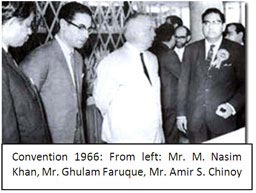 The First Convention was held on November 17 and 18, 1966 (i.e. soon after the formation of Association) in Karachi. The theme of the convention was: “The Role of Management in Pakistan”. It was inaugurated by Mr. Ghulam Faruque, the then Federal Minister of Commerce. The papers were read, by senior executives from various commercial and industrial organizations.
Papers were presented on the following topics:
FINANCIAL MANAGEMENT
The First Convention was held on November 17 and 18, 1966 (i.e. soon after the formation of Association) in Karachi. The theme of the convention was: “The Role of Management in Pakistan”. It was inaugurated by Mr. Ghulam Faruque, the then Federal Minister of Commerce. The papers were read, by senior executives from various commercial and industrial organizations.
Papers were presented on the following topics:
FINANCIAL MANAGEMENT
- Capital Investment
- Profit Appropriation Policies
- Role of Entrepreneur
- Production Planning & Control
- Quality Control
- Productivity
- Recruitment
- Training and Development
- Motivation
- Product Introduction
- Advertising and its Importance in the Marketing Mix
- Export
